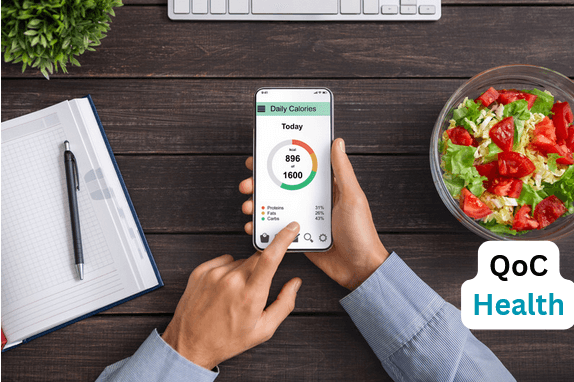From monitoring your meals to calorie counting and friendly exercise reminders – they’ve got it all covered. Now, let’s uncover these apps’ inner workings and whether or not they really work for weight loss and why they might be your perfect companion.
Over the last decade, a digital health revolution has transformed various aspects of healthcare, including weight management, through mobile apps.
These applications have flooded app stores, offering diverse features and tools. Their popularity stems from unparalleled convenience.
A smartphone in your pocket grants access to a personal weight loss assistant available 24/7. Tracking meals, calories, and workouts becomes effortless. No more paper or complex spreadsheets; it’s all on your screen.
These apps also personalize recommendations based on your age, weight, and activity level and foster social connections for motivation. However, their true effectiveness remains a crucial question.
The Science Behind Weight Loss Apps
Weight loss apps are more than colorful charts; they’re grounded in behavioral psychology and science. They track meals, exercise, and sleep, fostering accountability. These apps break big goals into achievable steps and provide valuable progress insights.
However, their effectiveness varies from person to person, and user adherence is crucial. Some may find them overly obsessive, and there’s a risk of over-reliance.
Using these apps as tools within a holistic approach to health is essential rather than as quick fixes. Making informed choices about their use is key to successful weight loss.
Related: Can People Lose Weight With My Fitnesspal Application?
Benefits of Using Weight Loss Apps

So, what are the good things about using weight loss apps? Let’s explore the benefits of having one of these apps in your pocket.
1. Accountability: When you track your food and exercise, you become more accountable for your choices. It’s like having a friend who reminds you to stay on track.
2. Goal Achievement: These apps help you set clear goals. Whether you want to lose 10 pounds or run a 5K, they break it down into achievable steps. This sense of progress can keep you motivated.
3. Education: Many apps offer educational content. You can learn about proper nutrition, effective workouts, and even the importance of sleep. Knowledge is a powerful tool on your weight loss journey.
4. Meal Planning: Some apps provide meal planning tools. They suggest healthy recipes based on your dietary preferences. This can make it easier to stick to a balanced diet.
5. Community Support: Many weight loss apps have built-in communities where you can connect with others on a similar journey. Sharing your successes and challenges with others can be inspiring and comforting.
6. Accessibility: Apps are always with you. You can access your weight loss tools at home, work, or vacation. There is no need to carry around notebooks or printed meal plans.
7. Personalization: These apps tailor their recommendations to your specific needs. They adapt as your goals and preferences change.
These benefits make weight loss apps appealing to many. But, as with anything, there are also downsides. Let’s take a look at those in the next section.
Related: Should You Invest Your Time On Calorie Counting Apps?
Drawbacks and Limitations
While weight loss apps offer many advantages, they are havens. It’s essential to be aware of these potential drawbacks before entirely relying on them.
1. Accuracy: Apps rely on the information you provide. If you enter correct data or remember to log meals, the accuracy of your tracking can improve.
2. User Adherence: Only some people stick with the app. Some people may lose interest or find the tracking process tedious. The effectiveness of the app depends on your commitment.
3. Psychological Impact: Constantly monitoring your food and exercise can lead to obsession and anxiety for some individuals. It’s crucial to maintain a healthy mindset throughout your weight loss journey.
4. Over-Reliance: There’s a risk of becoming overly reliant on the app. While they can be helpful tools, they should complement a balanced lifestyle, not replace it.
5. One Size Doesn’t Fit All: What works for one person may not work for another. These apps offer general advice, but individualized guidance from a healthcare professional might be necessary.
6. No Quick Fixes: Weight loss apps are not magic wands. They can assist, but they won’t provide instant results. Sustainable weight loss still requires time, effort, and patience.
Understanding these limitations is essential for making the most of weight loss apps. They can be valuable tools, but they should be part of a broader plan for a healthier you.
Choosing the Right Weight Loss App
With countless weight loss apps available, how do you pick the right one? Let’s explore some essential tips for finding the perfect fit.
1. Define Your Goals:
Determine what you want to achieve. Are you aiming for weight loss, muscle gain, or better overall health? Different apps cater to other goals.
2. Read Reviews:
User reviews can provide insights into app functionality and effectiveness. Look for apps with positive feedback and high ratings.
3. Features That Matter:
Consider the most important features. Do you want meal tracking, workout plans, or a community forum? Choose an app that aligns with your needs.
4. Compatibility:
Ensure the app is compatible with your operating system. You don’t want to download an app only to find it won’t work on your phone.
5. Cost:
Many weight loss apps [1] offer free versions with limited features and premium subscriptions. Decide if you’re willing to pay for additional benefits.
6. Trial Period:
If available, try the free trial before committing to a subscription. It’s a great way to test the app’s usability and see if it suits your lifestyle.
7. Data Privacy:
Check the app’s privacy policy. Ensure your data is secure and won’t be misused.
Popular Weight Loss Apps and Their Features
Now that you know what to look for in a weight loss app, let’s explore some popular ones and what they offer.
MyFitnessPal
This app is a favorite among many. It allows you to track your food intake and exercise and provides a vast database of foods for easy logging. You can set personalized goals and connect with a supportive community.
Lose It!
Lose It! is user-friendly and offers a barcode scanner for easy food tracking. It also provides personalized meal plans and tracks your progress over time.
Weight Watchers (WW)
WW offers a comprehensive approach to weight loss. It assigns point values to foods, encouraging you to make healthier choices. It also includes a social component for motivation.
Fitbit
If you have a Fitbit device, their app can sync seamlessly. It tracks your steps, exercise, and sleep, providing a holistic view of your health.
Noom
Noom takes a behavioral approach to weight loss. It offers coaching and goal setting and helps you build healthy habits over time.
SparkPeople
SparkPeople offers tracking tools, workout videos, and a supportive community. It’s a one-stop shop for your weight loss journey.
Remember that the effectiveness of these apps can vary from person to person. Some may prefer the simplicity of MyFitnessPal, while others may resonate with the community aspect of Weight Watchers. It’s worth trying to see which aligns best with your needs and preferences.
Conclusion
Weight loss apps promise accountability, goal setting, and education, backed by research and success stories. However, it is crucial to recognize their limitations, like user adherence and psychological impact. They should complement a holistic approach to health, not replace it. Make an informed choice based on your goals and needs for a healthier you.
- How To increasebrown fat: What To Take? - July 23, 2024
- Does Brown Fat Make You Lose Weight? Benefits And Impact - July 21, 2024
- Does Coffee Increase Brown Fat? - July 15, 2024
